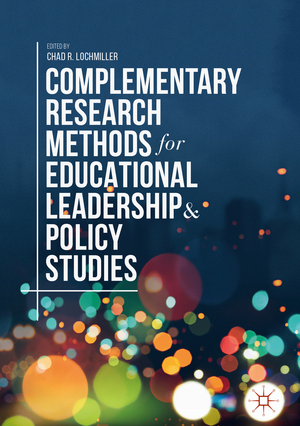Complementary Research Methods for Educational Leadership and Policy Studies
Editat de Chad R. Lochmilleren Limba Engleză Hardback – 14 sep 2018
| Toate formatele și edițiile | Preț | Express |
|---|---|---|
| Paperback (1) | 1112.00 lei 6-8 săpt. | |
| Springer International Publishing – 21 dec 2018 | 1112.00 lei 6-8 săpt. | |
| Hardback (1) | 1116.40 lei 6-8 săpt. | |
| Springer International Publishing – 14 sep 2018 | 1116.40 lei 6-8 săpt. |
Preț: 1116.40 lei
Preț vechi: 1361.46 lei
-18% Nou
Puncte Express: 1675
Preț estimativ în valută:
213.62€ • 222.60$ • 176.88£
213.62€ • 222.60$ • 176.88£
Carte tipărită la comandă
Livrare economică 03-17 aprilie
Preluare comenzi: 021 569.72.76
Specificații
ISBN-13: 9783319935386
ISBN-10: 3319935380
Pagini: 390
Ilustrații: XXIV, 388 p. 16 illus.
Dimensiuni: 148 x 210 mm
Greutate: 0.66 kg
Ediția:1st ed. 2018
Editura: Springer International Publishing
Colecția Palgrave Macmillan
Locul publicării:Cham, Switzerland
ISBN-10: 3319935380
Pagini: 390
Ilustrații: XXIV, 388 p. 16 illus.
Dimensiuni: 148 x 210 mm
Greutate: 0.66 kg
Ediția:1st ed. 2018
Editura: Springer International Publishing
Colecția Palgrave Macmillan
Locul publicării:Cham, Switzerland
Cuprins
Chapter 1. Complementary Research Methods: An Introduction and Overview
Chapter 6. Critical Research Perspectives in School Leadership: Putting Dignity and Humanity at the Center
Chapter 8. Secondary Data Analysis in the Field of Educational Leadership and Policy Studies
Chapter 17. International Network as Sites for Research on Successful School Leadership
Part I. Qualitative and Critical Approaches to the Study of Educational Leadership and Policy
Chapter 2. Qualitative Research in Educational Leadership Studies: Issues in the Design and Conduct of Studies
Chapter 3. The DIVE Approach: Using Case-Ordered Meta-Matrices and Theory-Based Data Displays to Analyze Multiple Case Study Data
Chapter 4. Language-Based Methodologies for Policy and Leadership Research
Chapter 5. Doing Critical Policy Analysis in Education Research: An Emerging Paradigm
Chapter 7.The Potential of (Participatory) Action Research for School Leaders, Local Policy Makers, and University-Based Researchers
Part II. Quantitative Approaches to the Study of Educational Leadership and Policy
Chapter 9. Matching Strategies for Causal Inference with Observational Data in Education
Chapter 10. Using Quantitative and Qualitative Methods to Study the Content and Effects of Curriculum Materials
Chapter 11.Value-Added and Growth Models in Education Research
Chapter 12. Social Network Analysis Methods in Educational Policy Research
Chapter 13. Essential Steps to Assessing a School System’s Fiscal Health
Chapter 14. Evaluating Education Costs
Part III. Mixed, Applied, and Collaborative Approaches to the Study of Educational Leadership and Policy
Chapter 15. Using Mixed Methods to Inform Education Policy Research
Chapter 16. Program Evaluation Methods for PK-12 Education
Chapter 18. Taking Stock of Complementary Research Methods: The Perpetual Quest for Good Research Methods for Educational Leadership and Policy
Notă biografică
Chad R. Lochmiller is Assistant Professor in the Department of Educational Leadership and Policy Studies in the School of Education at Indiana University, USA.
Caracteristici
Draws upon the expertise of educational leadership researchers, policy scholars, and research methodologists who have undertaken detailed and rigorous research and written influential methodological arguments about educational leadership and policy
Chapters will include an introduction to the methodology or approach described, a discussion of relevant theoretical perspectives, a brief review of extant research, and a section drawing upon the author’s expertise to offer novice and experienced researchers recommendations about employing the methodology in their own work
Brings together the various perspectives presented within the volume to articulate a methodological future for the field using a complementary approach to research in educational leadership and policy
Chapters will include an introduction to the methodology or approach described, a discussion of relevant theoretical perspectives, a brief review of extant research, and a section drawing upon the author’s expertise to offer novice and experienced researchers recommendations about employing the methodology in their own work
Brings together the various perspectives presented within the volume to articulate a methodological future for the field using a complementary approach to research in educational leadership and policy
